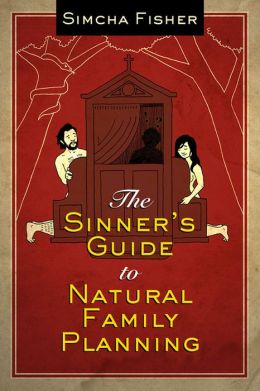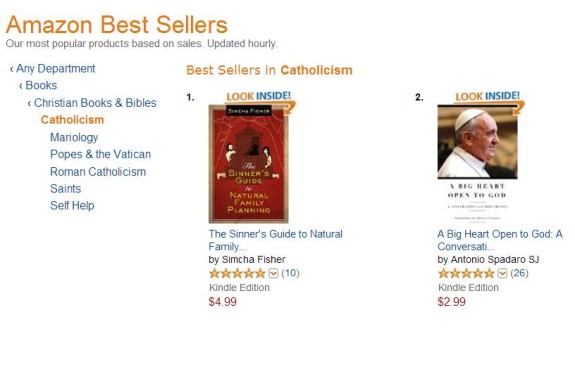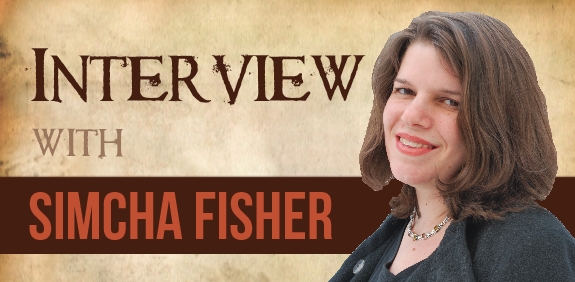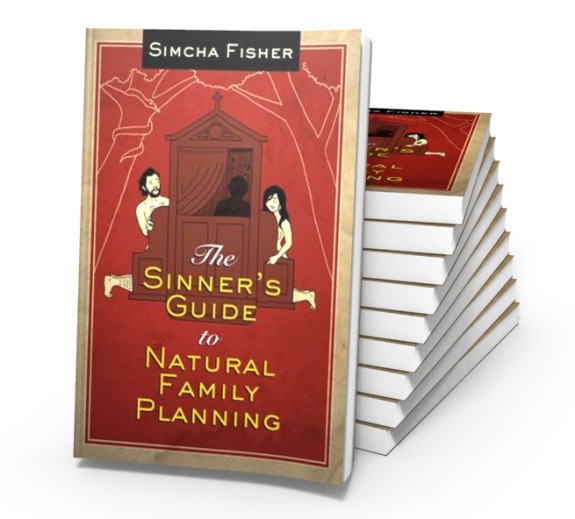If I ranked my favorite bloggers by their laughs-to-post ratio, Simcha Fisher would certainly be near the top. She’s known for her deep insights on faith, sex, parenthood, and femininity but what sets her apart is her humor. Wrapped around her wise and honest writing you’ll find heavy doses of sarcasm and self-deprecating wit, a combo that leaves you sighing and chuckling in equal measure. Few days go by without me or my wife asking each other: “Did you read Simcha today?”
 Several months ago, I received an email from Simcha announcing her first book. Titled The Sinner’s Guide to Natural Family Planning, it looked really exciting. The book set out to explore two very deep and important topics—sex and marriage—but with Simcha’s typical candor and fun. I hoped it would breath new life into Natural family planning (NFP), an awesome life-choice with a middling reputation.
Several months ago, I received an email from Simcha announcing her first book. Titled The Sinner’s Guide to Natural Family Planning, it looked really exciting. The book set out to explore two very deep and important topics—sex and marriage—but with Simcha’s typical candor and fun. I hoped it would breath new life into Natural family planning (NFP), an awesome life-choice with a middling reputation.
And Simcha did just that. Here were my thoughts after finishing:
“G.K. Chesterton once said, ‘A thing worth doing is worth doing badly.’ And anyone practicing Natural family planning knows what he means (hence the appropriate verb: practice.) In this excellent and witty book, Simcha Fisher unveils the joys, benefits, and inconvenient difficulties of Natural family planning. Refreshingly honest and joyful, the result is a desperately needed resource. All couples should read this book.”
Here’s Simcha’s own description of the book:
“So, you’ve decided to use Natural family planning.
Has it blessed your marriage? Deepened your respect for your body? Has it made your sex life fantastic? Do you and your spouse hold hands at sunset, and do pink flowers grow around your marital bed?
If so, this book is not for you.
But if you’ve tried Natural family planning and have discovered that your life is now awful—or if you feel judged or judgey, or if you trust NFP but your doctor doesn’t, or if just you’re trying to figure out how the heck to have a sex life that is holy but still human—you’ll find comfort, encouragement, honesty, wit, and, most importantly, practical advice in The Sinner’s Guide to NFP.
In a series of funny, frank, and profound essays, popular Catholic blogger and mother of nine Simcha Fisher shows what it’s really like to practice NFP, and how to achieve those fabled “marriage building” benefits.
The Sinner’s Guide to NFP helps you with:
- NFP and Your Spiritual Life
- NFP and the Rest of the World
- NFP in the Trenches
An easy and lively read, thoroughly grounded in orthodox Catholic theology, this book is packed with refreshingly frank insights about sex, love, and marriage. The next time you ask yourself, “If NFP is wonderful, why am I so miserable?”—don’t panic. The Sinner’s Guide to NFP is here to help.”
Fast-forwarding to a couple weeks ago, I received another email from Simcha, this one more frantic than excited. She had accidentally launched her new book on Amazon.com, several weeks before planned, and asked if I could help get the word out.
I of course agreed and joined with several other bloggers in spreading the news. Then we all watched as The Sinner’s Guide to Natural Family Planning shot up the charts. Amazingly, within twenty four hours, Simcha’s book became the #1 bestselling Catholic title on Amazon, even topping an obscure author in a white hat:

Besides simply being a great book, one reason so many people snatched it up is because Simcha priced the Kindle version at just $4.99 (!!). The paperback will be available soon but in the meantime you can’t beat that price.
Simcha graciously agreed to chat with me about her new bestseller, including the myths and truths of Natural family planning and why humor is a good approach to the topic.
BRANDON: Let’s start with the basics. What is Natural family planning and how is it different than artificial contraception?
SIMCHA FISHER: Natural family planning (NFP) is a method for avoiding or achieving pregnancy. It teaches a woman to recognize and track her body’s natural daily signs of fertility and infertility, so she and her husband can decide whether or not to have sex on those days.
NFP is different from artificial contraception because it doesn’t do anything, either to your bodies or to the sexual act. It just helps you figure out how to cooperate with the way your body already works. But artificial contraception changes the nature of the sex act, breaking up the unitive and procreative aspects of sex, and introducing something new into the way your bodies work.
Some people say that this difference is splitting hairs: if you’re trying not to get pregnant, you’re trying not to get pregnant—who cares how you achieve that goal? But there is all the difference in the world. Imagine if you wanted to lose weight. You could eat in moderation and with pleasure, or you could eat everything and anything that you want, and then stick your finger down your throat before the food can hit your stomach. The goal is the same, but we can see how different the methods are!
BRANDON: Most books on Natural family planning are straightforward, impersonal, and bland, but yours is full of humor and vulnerability. Why this approach?
SIMCHA FISHER: I remember first learning NFP, after our third child was born, and feeling so frustrated and alone. I read that NFP was “marriage building,” and that it might occasionally be “challenging,” and that it was important to be chaste and open to life. But how all of that was actually supposed to play out in our marriage, I had no idea. Since no one was talking about it, I assumed no one else was struggling. When I imagined putting up with that strain for another few decades, I wanted to just get a tubal and go to confession later.
The purpose of this book is to reassure people that they’re not alone—that most couples struggle sometimes, as they’re learning how to love each other. I offer practical advice for how to make things better, and encouragement to embrace the Cross. Overall, it’s really a book about love.
And yes, it’s full of jokes. Because sex is profound, but also hilarious.
BRANDON: What are the biggest myths surrounding Natural family planning?
SIMCHA FISHER: Oh, where to start? One oldie but goodie is that it’s the same as the rhythm method, and won’t work unless you ovulate on day 14 of your 28 day cycle. The truth is, modern methods of natural family planning are so scientifically advanced, they are starting to be adopted by secular doctors.
Another myth is that NFP is just the Catholic brand of birth control—that there are plenty of ways to avoid pregnancy, and that the Church, being misogynistic and backward, has decided to give NFP the green light because they know you’ll end up with a million kids anyway. his is so silly, I don’t know where to begin. The Church’s acceptance of NFP to regulate births is completely consistent with every other truth she teaches about human sexuality.
Yet another myth is that NFP is easy and fun and you will barely even notice it because you will be so busy strolling down a beach at sunset while building your marriage. The truth is, there is joy and growth and holiness to be won through the practice of NFP. But many people have to hack their way through a jungle of misunderstandings and bad habits before they can meet on that beautiful shore! Helping people blaze that trail through the jungle is one of the main purposes of my book.
BRANDON: Some devoted Catholics grate against Natural family planning. What are their concerns and how would you respond?
SIMCHA FISHER: Some Catholics say that the Church only permits NFP to be used in “grave,” life-or-death circumstances, like if your whole family has leprosy, or your entire town has just been washed into the sea. Most of this concern is based on a simple mistranslation of a word in Humanae Vitae. Angela Bonilla deconstructs that misunderstanding very nicely here.
Another complaint is that most people who use NFP are abusing it, and don’t have a good enough reason to postpone a pregnancy—and that they might as well be contracepting. I refute this concern in the first several chapters of my book. God is calling us to holiness, not fertility contests. These matters are intensely private and personal, and vary so widely from couple to couple that it’s all we can do to keep our own hearts honest, without trying to manage other people’s consciences, too. It is monstrously wrongheaded to assume you know the first thing about a couple just because you know how many kids they have.
I have to scratch my head when some Catholics see small families in the pews and blame NFP. First of all, some of those couples are battling infertility, and would have no children at all, if it were not for NFP.
Second, I’m extremely skeptical that there are just gobs and gobs of couples willing to take on a labor-intensive, counter-cultural practice that requires self-sacrifice and discipline, just because they feel like spending an extra week in Cabo this year, and one more baby would cramp their style. Catholics who define NFP as the primary scourge of our time need to step away from the computers and get some fresh air.
BRANDON: Many people note that couples practicing Natural family planning typically have more kids than those who don’t. Does this mean that Natural family planning “fails” in its purpose?
SIMCHA FISHER: It’s funny, isn’t it? We have very strict Catholics bemoaning that NFP-ers are indistinguishable from the contracepting “one or none” crowd. At the same time, apparently it’s common knowledge that NFP-using couples have these huge, unwieldy, carbon-hogging megafamilies. It’s enough to make you wish people would just mind their own damn business and let us raise our kids, isn’t it?
But yeah, in communities with lots of Catholic families, you’ll see plenty of giant passenger vans parked in the driveways. There are a few reasons for this.
One reason is that Catholics are taught to love children—to see children as something that will make our lives better, make the world more meaningful, draw us closer to God. So maybe we use NFP to space out our pregnancies to catch a breath in between, but we still like kids, and have them if we can.
Another reason is, frankly, NFP can be hard. Some people try to avoid pregnancy, and either make a mistake on their charts, or else, in the heat of the moment, they tell their plans to take a flying leap—and have a baby even when they have a really good reason not to. So some big families are a result of “method error” or “user error,” because charting really is harder than just popping a pill.
But another very common reason is somewhere in the middle. Lots of people are ambivalent about conceiving, and they say they are putting off another pregnancy, but they get more and more careless about following “avoiding behavior.” They don’t exactly plan to get pregnant, but they aren’t really trying hard not to. Maybe they’re not absolutely smitten with bliss when they realize there’s another little guy on the way, but by the time the baby is born, they are thanking God that they were “careless” that one night, because look at this gorgeous baby.
One final thing: one way that NFP is different from contraception is that it’s quite possible for the practice of NFP—for the self-discipline, the sacrifice, the prayer, the self-denial—to change our hearts. We may start out using NFP to strictly limit our family size for purely selfish reasons, and actually learn, through the practice of NFP, to be more welcoming of children, or more open to God’s will in general. Go ahead, ask me how I know!
BRANDON: What would you say to a young couple considering Natural family planning but who are scared they might end up with twenty kids?
SIMCHA FISHER: I would suggest finding the happiest Catholic couple you know, making friends with them, and asking for some advice. Making assumptions, jumping to conclusions, and acting out of fear—these are not the way to a joyful, meaningful life, whether we’re talking about family planning or anything else.
What I’m trying to encourage, most of all, is for people to talk to each other. For Catholics to talk to other Catholics, laymen to talk to priests about the struggles they are enduring, priests to talk to laymen about the reason behind the Church’s teaching. And most of all, for husband and wives to talk to each other, and for both of them to talk to God. Conversation, the communion of heart to heart, is where love is born.
For more, check out Simcha’s blog at Patheos or her National Catholic Register blog. Also, pick up her newest book (for only $4.99!) titled The Sinner’s Guide to Natural Family Planning.
If you liked this discussion you’ll find several more on my Interviews page. Subscribe free via feed reader or email and ensure sure you don’t miss future interviews.


